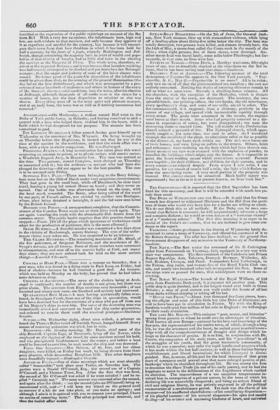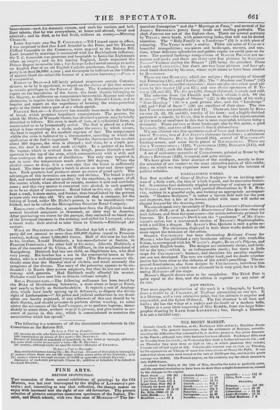THE Cortowavoas—It is reported that the 23rd September has been
fixed for this ceremony, and that it will be attended with much less pa. rade than usual.
THE Desse OF Waisanauroar AND THE Bir.r..—It is said that his Grace is much less disposed to withstand Ministers and the Bill than the partisans of those who would fain have him for a leader are willing to admit. We do not think this at all unlikely. If the Duke can be once convinced that Reform is necessary, he will unquestionably advocate a large and complete Reform ; lie would as soon dream of a " moderate victory" as of a " moderate reform." The Po.t1 this morning is so eager in its denial of the Duke's conversion, that we are inclined to give some credence to the report. YEOMINRY.—Some gentlemen in the district of Wymersley lately determined to raise a troop of Yeomanry, and offered the command of it to Sir Robert Gunning. The offer has been declined, on the ground that Government disapprove of any accession to the Yeomanry of Northamptonshire.
THE NAVY.—The fleet under the command of Sir E. Codrington sailed from Portsmouth on Thursday, fully equipped in every way with their war complement. The fleet consisted of the Caledonia and Prince Regent flag-ships, Asia, Talavera, Donegal, Revenge, Wellesley, Alfred, Braham, Curasoa, and Pearl. Commodore Lord Yarborough, in the Falcon, ship yacht, and twenty-five of the Royal Yacht Club vessels, and nearly two hundred other sail, accompanied the fleet. Some of the ships were so pressed for men, that midshipmen were on shore recruiting. THE ROYAL Wisstam.—The launch of the Royal William, of 120 guns, from Pembroke Dock-yard, is postponed till another year. This noble ship is quite finished, and is the largest vessel ever built in Great Britain ; a man of good stature can walk under the beams of all her three decks without stooping or taking off his hat. "HENRY THE -Pwru."—About four thousand five-franc pieces, bearing the effigies and arms of this little boy (the Duke of Bordeaux) are said to have been put in circulation in France. We wish the King of Sardinia would send four million of his coin to Englund: we will engage for their ready circulation. THE LATE Mn. Roscom—This eminent "poet, orator, and historian" sprung from parents to whom he could owe no advantages of situation. Well known all over Europe—eminent for his love and knowledge of the fine arts, the representative of his native town, of which, through a long life, he was the ornament and the boast, he united great practical know. ledge with all the comprehensiveness of thought and design which belongs to the character of genius. It is to him, in conjunction with Dr. Currie, the companion of his early years, and his " prmsidium" in all the struggles of his youth, that the great mercantile community, of which he was a member, may refer the rapid intellectual progress which it has made within the last half century, as well as those various literary establishments and liberal institutions for which Liverpool is distin. guished. Not, however, all his zeal for the local interests of that great mart of commerce could prevail over that more enlarged passion of philanthrok'which he cherished throughout life. He was among the first to denounce the Slave Trade (in one of his early poems), and he had the happiness to assist in the deliberations of the Legislature which ratified its abolition. The improvidence of a too sanguine temperament involved him in enterprises of a private nature, by the issue of which his declining life was mournfully chequered ; and being an ardent friend of. civil and religious liberty, he was actively engrossed in all the political controiersies of a revolutionary period. Yet such was the charm of his manner—of his unaffected cheerfulness—of his conciliating disposition— of his playful humour—of his natural eloquence—his open and candid dealing—of his evident and tukceasing kintIneaa Of heart, and universal
benevolence—melt his domestic virtues, and such his various and brilliant talents, that he was everywhere, at home and abroad, loved and admired ; and he died, as he had lived, without an enemy.—/Iforning Chronicle.
LORD ARUNDEL AND SIR T. CONS TABLE.—Till traced cause to effect, I was surprised to find that Lord Arundel in the Peers, and Sir Thomas
Clifford Constable in the Commons, were opposed to the Reform Bill. Lord Arundel by marriage is connected with the Buckingham influence. Sir T. C. Constable was generous and hospitable to Louis the Eighteenth
when an emigre; and on his leaving England, Louis requested the
Prince Regent to ennoble him ; but George lacked moral courage to make an English Peer of an old English Catholic gentleman, though his pro perty is at least 30,000/. a year ; and thereupon he inflicted on the Clifford of ancient blood the miserable honour of a modern baronetcy.—From a correspondent.
FOREST OF DEAN.—A bill lately printed empowers certain Commissioners, to be by it appointed, to report on the claims of the free miners
to certain privileges in the Forest of Dean. The Commissioners are to report on the boundaries of the forest, the lands therein belonging to his Majesty, to deliberate on compromises between his Majesty and other claimants, to inquire into the local limits of St. Briavel's Court, and to inquire and report on the expediency of forming the extra-parochial parts of the forest into a part of or a whole parish.
PATENT BREAD.—A discovery has recently been made in the baking of bread, which promises important consequences. The process, for
which Mr. Hicks, of Wimpole Street, has obtained a patent, may be briefly described as follows. His oven is made of iron, of a cylindrical form, so constructed as to be hermetically sealed. The fuel is placed on a plate,
which is kept revolving in a circle, under the oven ; by which means, he heat iS supplied at the smallest expense of fuel. The temperature within the oven is indicated by a thermometer, according to which the application of the fuel is regulated. When the thermometer has reached about 300 degrees, the oven is charged ; and then, by a slmple process, the door is closed and made air-tight. In a quarter of an hour, the vapour, which is evolved from the dough, passes through a small aperture in the top of the oven, which communicates with a still, and thus undergoes the process of distillation. The only care required is, mot to raise the temperature much above 309 degrees. When the alcohol ceases to drop, it is a sure sign that the bread is sufficiently baked. The time to complete a batch is about an hour and three quarters. Each quartern loaf produces about an ounce of proof spirit. The advantages of this invention are many and obvious. The bread is purified, and rendered of superior quality, by the expulsion, in vapour, of all the matter which, when allowed to remain, renders it acid and unwholesome ; and this very matter is converted into alcohol, in such quantity as to be an object of importance. Bread baked in this way, after being kept a week, is more moist, and fresher, than bread baked by the present process only two days old. We are informed that a company, for the baking of bread, under Mr. Hicks's patent, is to be immediately established, and to be called the Metropolitan Genuine Bread Company.
MITGRATION.—On Saturday, a Steam-boat from the Highlands landed several hundred emigrants at Greenock, on their way to America. After purchasing sea stores for the passage, they embarked on board one of the Liverpool steamers in the evening, and sailed for Liverpool, where a vessel waits their arrival to take them to Canada.—Edinburgh Advertiser. • WILL or DiEniTscir.—The late Marshal has left a will. His property did not amount to more than 500,000 thalers (equal to Prussian crowns), making about 1,(i00,009 francs. Half of this sum he has left to his brother, Arnold Diebitsch, a hat-manufacturer at Stettin, in Prussian Pomerania ; the other half to his sister, Albertin Diebitsch, nun of the convent of St. !Arica, at Wolff hart, in the neighbourhood of Konigsburg. Diebitsch had but one child, an illegitimate son, who died very young. His brother has a son in the commercial house at Bordeaux, who is a well-educated young man. [The Russian accounts distinctly state that the Marshal died of cholera, and detail minutely the symptoms of the disease. The story of the poisoning appears to be unfounded: in Russia they poison emperors, but they do not use such ceremony with generals. Had Diebitsch really offended his master, Nicholas would have sent him to Siberia without scruple.] ROYAL PansEcterons.—The following ordinance has been issued by the Duke of Merklenburg Schwerin, a state about as large as Essex, 3nd nearly as fertile as Sutherlandshire. It regards a sect of Anabaptists, which have lately sprung up in Schwerin, to dispute the divine right of Lutheranism—" All police and judicial authorities in our dominions are hereby enjoined, if any adherents of this sect should be in their district, and should presume to perform divine worship, to admi . nister the sacrament of the Lord's supper, or to perform baptism, immediately to arrest them without respect to persons, and give notice to our court of justice in this city, which is commissioned to examine the sectarianism which has spread."

























 Previous page
Previous page